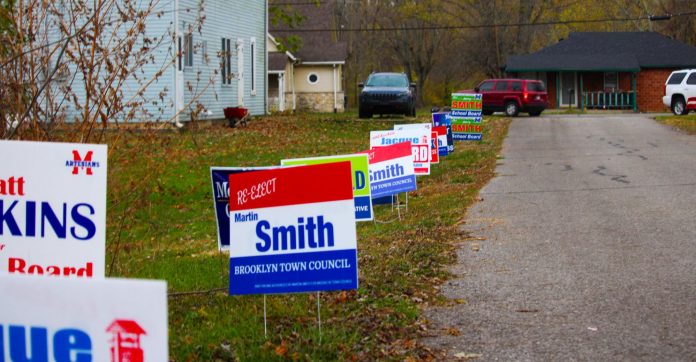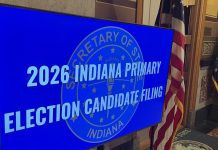‘One-party state’: Indiana Democrats accused of not having a ‘winning message’
By Dwight Adams, The Indiana Citizen
This fall, Indiana Democrats held hopes that they could defend their 30 seats in the state legislature and maybe even pick up a few more. They called their effort to gain more balance in the Indiana General Assembly their “Break the Supermajority” tour.
However, those expectations fell short after Tuesday’s election, with that trend especially evident in Indianapolis’ northern suburbs and other key races statewide. One expert on Indiana politics said a key reason might be because the Democrats don’t have a winning message for Hoosier voters.
“Obviously, Republicans did as well as they could have hoped. They’re going to have a supermajority again,” said Aaron Dusso, associate professor of political science at Indiana University-Indianapolis. “From the Democrats’ perspective, they have to be bitterly disappointed at failing to break through. They have to be asking themselves, ‘What are we doing wrong?’ because they’re not making any headway.”
In one such race, an open seat in House District 24, which includes parts of Boone and western Hamilton counties, Republican Hunter Smith, a former punter with the Indianapolis Colts and now a local farmer, won the seat formerly held by Republican Donna Schaibley by garnering 56% of the vote versus nearly 44% for Democrat Josh Lowry.
And in another race in District 39, which centers around Carmel, Republicans and Democrats battled over another open seat, which had been held for nearly three decades by Republican Jerry Torr before he decided not to run for reelection. Despite the Democrats fielding a candidate, Matt McNally, who had run a close race against Torr in 2022, the GOP candidate, Pacers Sports & Entertainment executive Danny Lopez won the seat with nearly 54% of the vote to McNally’s 46%.
In another closely watched race in District 62, covering Bloomington, Brown County and part of Jackson County, Republican incumbent Dave Hall was leading his Democratic challenger, Thomas Horrocks, as of 4 p.m. Wednesday with 51.1% of the vote, compared to Horrocks’ 48.9%.
The race for another Indianapolis-area seat in District 25, which covers parts of Boone and Hendricks counties, was too close to call Wednesday afternoon, with incumbent Republican Becky Cash holding onto 50.1% of the vote, compared to 49.9% for the Democratic challenger, Tiffany Stoner.
In other important races, longtime Republicans carried their seats. That includes Ed Soliday, first elected in 2006, who kept his House District 4 seat, which includes Valparaiso. Greg Steuerwald, who has been in the Indiana House since 2007 and is now majority caucus chair, also won reelection to his District 40 seat, which includes a portion of Hendricks County, including Avon.
Democrats: ‘Not what we hoped for’
Indiana’s Republicans currently hold a 70-30 advantage in the General Assembly. That supermajority means that they control at least two-thirds of the seat in the legislature and can conduct business, including passing legislation, without the other party’s participation or assent.
The Indiana Democratic Party released a statement late Tuesday from Chairman Mike Schmuhl that clearly expressed their disappointment in the outcome of the 2024 Statehouse races.
“Tonight, the results were not what we hoped for, but we want to thank the millions of Hoosiers who made their voices heard in this election, and our statewide candidates Jennifer McCormick, Terry Goodin, Destiny Wells, and Valerie McCray for running meaningful campaigns and connecting with Hoosier voters across our state,” Schmuhl said. “We still believe Hoosiers deserve more balance in our state’s politics and a party that works every day to hold our state government to account, and fights for more freedoms and opportunity. That’s what our party will continue to do in the coming weeks, months, and years.”
Schmuhl also said in his statement that the Democrats’ unsuccessful campaigns, including those of McCormick, who ran for governor; Wells, who sought the attorney general’s seat; and McCray, who was the first Black woman to become a major party nominee for U.S. Senate in Indiana, brought integrity and a “message of hope, optimism and a better future” for “workers, women and all Hoosiers.”
Randy Head, chairman of the Indiana Republican Party, championed his party’s success in a statement to the press on Wednesday.
“Republicans had a huge red wave in Indiana,” Head said. “Our state was among the first to get called for Trump. Our governor-elect Mike Braun won by historic margins, Senator-elect Jim Banks had a huge win of 20 points, Attorney General Todd Rokita won his race by nearly 20 points and will continue to represent our state fighting for Hoosiers.”
Head also commented on the GOP’s continued dominance in the state legislature.
“We are proud that we will retain our super majorities in both the House and Senate. We look forward to the leadership our ticket will bring to the statehouse and in D.C. in 2025 and beyond.”
Was winning four more seats realistic?
Democratic leaders in Indiana attended a party caucus vote in June in Jeffersonville to elect a candidate to replace Rep. Rita Fleming, a Democrat who was retiring from her seat representing House District 71.
Democratic party faithful elected Wendy Dant Chesser in the caucus vote to replace Fleming. In what could be a bright spot for Indiana’s Democrats, Dant Chesser appears to be en route to holding onto her seat, garnering 49.9% of the vote so far, compared to her GOP opponent Scott Hawkins’ 46.3%.
At a small news conference before the June vote, Schmuhl and colleagues promoted an effort, called the “Break the Supermajority” tour, to flip at least four seats from the Republicans to the Democrats in the 2024 election.
Rep. Carey Hamilton, D-Indianapolis, who attended the caucus, told The Citizen at the time that she knew the task would be difficult, since the Democrats also would have to hold onto their 30 current seats, but Hamilton said the goal was achievable.
Democrats have said they believed they could loosen the GOP’s grip on the Indiana House if they struck a moderate tone to counterbalance what they called the growing extremism of Indiana Republicans. They assert that Republicans were not representing the views of Hoosiers on important issues, such as abortion rights, support for public education, gun safety and the legalization of medical marijuana.
However, Dusso is calling those assumptions into question.
For one, he said the state’s Democrats need a new strategy going forward, when he was asked whether the Democrats’ goals were realistic.
“If the idea that you want to break a supermajority isn’t realistic, then obviously you’re not a competitive party anymore. … What they’re doing is not connecting with Indiana voters,” Dusso said. “Their message has been, ‘We’re like Republicans but we’re nicer.’ But that’s not a winning message.”
He also said that calling Republicans “extremists” clearly isn’t resonating with Hoosier voters, either.
“I understand originally the strategy, but it’s at least 15 years old at this point. It’s not working. It’s time to move on,” Dusso said. “They have to work out a different strategy. … Just calling someone extreme is not good enough.”
Voters show frustration with political rhetoric
In talking with Hoosier voters at polling places in Zionsville and Carmel on Tuesday, a theme of dissatisfaction with extreme political rhetoric emerged.
Allison Dusko, a voter in Carmel’s District 24, said “politics is so terrible.”
“People don’t even pay attention to the issues,” she said. “They just vote along the party line. It’s silly to not know what the issues are.”
Kyle McCarty, who voted in Zionsville’s District 25, said he “hates” the current political atmosphere.
“I’m pretty moderate,” McCarty said. “I think the hyperbole that I see on each end of the spectrum is pretty crazy. The extremes we see all over, it’s pretty exhausting.”
Dusso said extreme political rhetoric is “a problem for democracy in general. There is a real danger there, (that) you lose trust in government and so forth.”
When asked whether extreme rhetoric and political stances might be affecting Hoosiers’ trust or willingness to vote, Dusso said “probably not.”
However, he did say that in the wake of this week’s election, Indiana Republicans’ positions on issues, such as educational policy, might actually “move more to the right.” He also doubted any gun regulations would pass, adding “certainly not at the state level.”
“They’ll (Indiana Republicans) do whatever they want to do because they face no opposition. There’s no indication that anyone in their position has anything to worry about,” Dusso said.
Dusso also said the lack of truly competitive races in Indiana could have adverse effects, including possibly the development of an insular attitude among the state’s residents.
“The issue is when you have this one-party state and this divide, what happens is that we as an electorate become less sensitive to the outside world,” Dusso said. “When you have uncompetitive elections, when you have this high divide between Republicans and Democrats, you have a context that there’s nowhere for voters to go (if they disagree) … because there’s no other option. We’re totally immune to anything that happens. We’ll stick with our party regardless.”
This article was published by TheStatehouseFile.com through a partnership with The Indiana Citizen, a nonpartisan, nonprofit platform dedicated to increasing the number of informed, engaged Hoosier citizens.
Dwight Adams is a freelance editor and writer based in Indianapolis. He is a former content editor, copy editor and digital producer at The Indianapolis Star and IndyStar.com and worked as a planner for other newspapers, including The Louisville Courier Journal.






It’s not their message it’s their actions…….
Whose mouths must be stopped, who subvert whole houses, teaching things which they ought not, for filthy lucre’s sake.
Titus 1:9-10
Comments are closed.